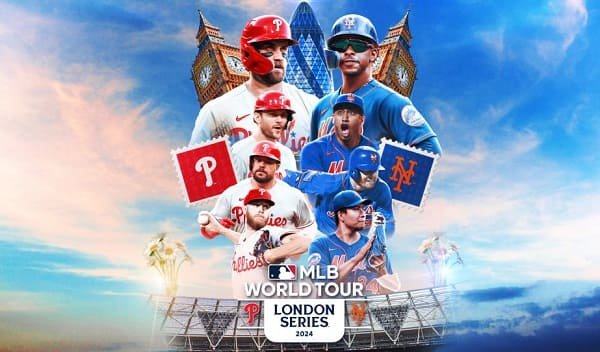MLB’s International Series has become a significant part of the sport’s growth. These games play a vital role in expanding baseball’s reach worldwide. Let’s analyze the impact of these international games.
Expanding the Fan Base
Global Exposure

The International Series brings MLB games to fans around the world. Hosting games in countries like Japan, Mexico, and the United Kingdom helps increase global exposure. Local fans get the chance to experience MLB action live.
This exposure helps attract new fans and grow the sport’s popularity globally. For example, games in Japan have drawn massive crowds, showcasing the country’s enthusiasm for baseball.
Drawing Massive Crowds
In Japan, games often sell out quickly, reflecting the country’s deep-rooted love for baseball. Fans fill the stadiums, creating an electric atmosphere that highlights baseball’s global appeal. This enthusiasm is mirrored in Mexico, where MLB games are celebrated events, drawing passionate fans from all over the country.
Media Coverage
These events generate significant media coverage, ensuring that highlights and key moments reach a global audience. Broadcasting games internationally brings MLB into millions of homes, increasing the sport’s visibility. This coverage not only boosts viewership but also attracts sponsors and partners eager to reach a broader market.
Cultural Exchange
These games are more than just baseball. They offer a cultural exchange, bringing people together from different backgrounds. Fans and players experience new cultures, food, and traditions. This exchange promotes understanding and appreciation between different communities.
Player Engagement
Players often participate in local events, such as visiting schools and hospitals, further enhancing cultural ties. For instance, during the London Series, players from both teams engaged in community activities, teaching baseball to local children and participating in charity events. These interactions foster goodwill and help build a positive image of baseball in host countries.
Fan Experience
Fans also benefit from this cultural exchange. They get to enjoy the unique atmosphere of MLB games while experiencing local customs and traditions. This blend of sports and culture creates memorable experiences for all involved. For example, fans attending games in Japan might enjoy traditional Japanese cuisine at the stadium, adding to the overall experience.
Special Events and Traditions
Celebrating Local Culture

The International Series often includes special events that highlight the host country’s culture. In Mexico, pre-game festivities might feature traditional music and dance, while in Japan, fans might enjoy ceremonial first pitches thrown by local celebrities.
These activities enrich the cultural experience and create a festive atmosphere that goes beyond the game itself.
Building Bonds
These games help build bonds between players and fans from different countries. Players get to experience the passion of international fans, while fans gain a deeper appreciation for the players and the game. This mutual admiration helps strengthen the global baseball community.
Boosting Local Economies
Economic Benefits
Hosting MLB games boosts local economies. Fans traveling to see the games spend money on hotels, restaurants, and souvenirs. This influx of visitors benefits local businesses and creates job opportunities. The games also attract media attention, further promoting tourism.
Local Business Boost
For instance, the London Series in 2019 brought significant economic benefits to the city, with thousands of international visitors. Local hotels experienced higher occupancy rates, and restaurants saw increased patronage.
Souvenir shops, transportation services, and local attractions also benefited from the influx of baseball fans. The economic ripple effect extended beyond the immediate vicinity of the stadium, positively impacting the broader community.
Media Attention and Tourism
The media attention generated by these games also plays a crucial role in promoting tourism. International broadcasts and news coverage highlight the host city, showcasing its attractions and amenities to a global audience.
This exposure can lead to increased tourist interest and future visits, further boosting the local economy. For example, media coverage of the Tokyo Dome games has highlighted Japan’s rich cultural heritage, attracting tourists eager to explore the country.
Infrastructure Development
Cities hosting these games often invest in infrastructure improvements. New stadiums and facilities are built or upgraded, benefiting the local sports community. These improvements leave a lasting legacy, providing better amenities for future events and local sports leagues.
Stadium Upgrades
In Mexico, for example, investments in stadium upgrades have enhanced local sports facilities. Renovations to Estadio de Béisbol Monterrey included improved seating, upgraded lighting, and enhanced player facilities.
These upgrades not only benefit MLB games but also local and regional baseball events, boosting the overall quality of sports infrastructure.
Long-term Community Benefits
The lasting legacy of infrastructure development extends beyond baseball. Improved facilities can be used for a variety of community events, from concerts to local sports leagues. This versatility ensures that the investments made for MLB games continue to benefit the community long after the final pitch.
Enhanced sports complexes can host youth leagues, school events, and community gatherings, fostering a vibrant local sports culture.
Job Creation and Training
Infrastructure projects also create job opportunities. Construction projects employ local workers, and the ongoing maintenance and operation of new facilities provide additional employment. Furthermore, these projects often include training programs, helping locals develop skills that benefit the broader community.
Sustainable Development
Many cities use the opportunity to incorporate sustainable practices into their infrastructure projects. For example, new stadiums might include energy-efficient lighting, water conservation systems, and waste reduction programs.
These sustainable practices help minimize the environmental impact of large events and promote long-term ecological benefits for the host city.
Enhancing Player Experience
Unique Challenges
Playing in different countries presents unique challenges for players. They adapt to different climates, time zones, and playing conditions. These experiences help players grow and develop resilience. It also allows them to showcase their talents to a global audience.
Adapting to New Environments
Players must adjust their routines, which can enhance their flexibility and adaptability. For example, playing in Japan might require adjusting to higher humidity, while games in London might present cooler temperatures.
Each environment requires different preparation strategies. Adapting to these conditions helps players become more versatile and improves their overall performance.
Travel and Jet Lag

Dealing with long flights and jet lag is another challenge. Players often cross multiple time zones, which can disrupt sleep patterns and physical conditioning. Teams employ sports scientists and nutritionists to help players manage these challenges.
Proper rest, hydration, and nutrition become critical. These strategies help players maintain peak performance despite the physical demands of travel.
Playing Conditions
Different countries have unique playing conditions, such as varying field surfaces and stadium altitudes. For instance, stadiums in Mexico City are at high altitude, affecting how the ball travels. Players must quickly adapt to these conditions to perform at their best. These experiences teach players to be more observant and adaptive, skills that are valuable in any competitive situation.
Building Bonds
Traveling and playing internationally helps build team bonds. Players spend more time together, fostering camaraderie and team spirit. These experiences create lasting memories and strengthen team dynamics.
Team Activities
Shared adventures, such as exploring new cities and trying local cuisines, help build stronger connections. Teams often schedule group activities, such as sightseeing tours or team dinners.
These activities provide opportunities for players to bond outside of the game. Experiencing new cultures together strengthens relationships and creates a sense of unity.
Overcoming Challenges Together
Facing the challenges of international travel and competition can also bring teams closer. Working through the difficulties of jet lag, unfamiliar environments, and different cultures requires teamwork and support.
Players rely on each other for motivation and encouragement, which builds trust and camaraderie. These shared challenges forge stronger team dynamics and enhance overall performance.
Cultural Appreciation
Experiencing new cultures firsthand allows players to develop a deeper appreciation for diversity. Trying local foods, learning about different traditions, and interacting with international fans broaden players’ perspectives. This cultural appreciation fosters respect and empathy within the team, enriching their overall experience.
Lasting Memories
The unique experiences of playing internationally create lasting memories for players. Whether it’s a thrilling game, a memorable meal, or a meaningful interaction with fans, these moments stay with players throughout their careers. These shared memories contribute to the team’s history and legacy, adding depth to their professional journeys.
Promoting Baseball Development
Inspiring Future Talent

The International Series inspires young athletes worldwide. Watching MLB stars play live motivates aspiring players to pursue baseball. Local clinics and events held alongside these games provide coaching and development opportunities. This helps nurture future talent and grow the sport at the grassroots level.
Local Clinics and Workshops
MLB often partners with local organizations to host youth clinics and workshops, providing young players with invaluable training and exposure. These clinics are led by MLB players and coaches, offering high-quality instruction and inspiration.
Young athletes learn fundamental skills and advanced techniques, which helps improve their game. For example, during the London Series, MLB hosted multiple clinics for local youth, giving them hands-on experience with professional players.
Role Models and Inspiration
Seeing their heroes in action encourages young athletes to dream big. The presence of MLB stars in their home country provides a tangible connection to the sport. This inspiration can lead to increased participation in local baseball programs.
Aspiring players are motivated to work harder and pursue their dreams, knowing that success is possible. The impact of these role models is profound, often sparking a lifelong passion for baseball.
Long-term Development
The exposure and training provided by these events contribute to long-term development in the sport. As young players develop their skills, they raise the overall level of play in their regions. This creates a stronger talent pool for future professional leagues.
Additionally, the knowledge and techniques shared by MLB professionals help improve coaching standards locally, further enhancing player development.
Strengthening International Relations
MLB’s international presence strengthens relationships with baseball organizations worldwide. Collaborations and partnerships are formed, promoting the sport’s development globally. These relationships help share resources, knowledge, and best practices, benefiting the baseball community.
Collaborative Partnerships
For example, MLB’s partnership with Japan’s Nippon Professional Baseball (NPB) has led to greater collaboration and talent exchange. These partnerships facilitate player transfers, joint training programs, and friendly matches.
Such collaborations enhance the quality of baseball played in both regions. They also provide opportunities for cultural exchange and mutual learning, enriching the sport as a whole.
Global Baseball Ecosystem
Strengthening these relationships helps build a global baseball ecosystem. Shared resources and knowledge contribute to the sport’s growth and sustainability. International tournaments and exhibitions foster competitive spirit and camaraderie among nations.
The interconnectedness of baseball organizations worldwide promotes a unified approach to developing the sport. This global network supports emerging baseball markets and encourages innovation in training and play.
Talent Exchange
Collaborations between MLB and international leagues also lead to talent exchange. Players from different countries get opportunities to compete in various leagues, broadening their experience and exposure.
This exchange benefits the players’ development and enriches the leagues with diverse talents and playing styles. It also increases the sport’s global appeal by showcasing international stars on different platforms.
Expanding Broadcast Reach
Increased Media Coverage
The International Series attracts significant media coverage. Games are broadcasted globally, reaching millions of viewers. This increased coverage helps promote the sport and attract new fans.
Enhanced media coverage also includes special features and behind-the-scenes content, giving fans a deeper connection to the game. Networks often air player interviews, cultural segments, and historical pieces, providing a richer viewing experience.
Social Media Engagement

These international games generate buzz on social media platforms. Fans share their experiences, photos, and videos, creating a global conversation. This engagement helps build a stronger, more connected baseball community.
MLB’s social media channels often feature highlights and stories from these games, increasing engagement and reach. Fans from different parts of the world can interact and share their love for baseball, fostering a sense of global unity.
Interactive Experiences
MLB leverages social media to create interactive experiences for fans. Live Q&A sessions with players, virtual stadium tours, and fan polls enhance engagement. These activities make fans feel more connected to the events, even if they cannot attend in person.
Social media campaigns also promote upcoming games, generating excitement and anticipation. The interactive nature of these platforms allows MLB to engage with fans directly and build a loyal global following.
A Global Game
MLB’s International Series plays a crucial role in the sport’s expansion. It brings the excitement of baseball to new audiences, boosts local economies, and enhances player experience. These games inspire future talent and strengthen international relationships. The impact of the International Series is far-reaching, making baseball a truly global game. Through these efforts, MLB continues to grow its global footprint, fostering a love for baseball around the world.





